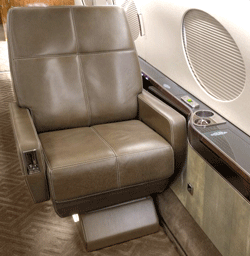Contributed by Gary Harpster, Avionics Sales Representative

A WAAS/LPV approach eliminates altitude errors caused by extreme temperatures.
The altimeter reading in an aircraft with Air Data Computers, displays the altitude based on barometric pressure. Temperature plays a role in the accuracy of this information. When the air is cold, it is condensed and the altimeter reading will be less than the true altitude. Conversely, in hot weather the uncompensated altitude will bring the aircraft higher than the published alt constraint. That is why settings must be adjusted by the crew based on the readings provided by Air Traffic Control (ATC) or the controlling agency for the area they are flying in. This adjustment can be 100-300 feet depending on the temperature.
During an approach with WAAS/LPV, the initial vertical guidance is computed by the Flight Management System (FMS) based on the current altitude the aircraft believes it is flying at. At some point during the approach, the vertical guidance computed by the Air Data Computers will transition over to vertical guidance from GPS satellites. Once this transition occurs, the Air Data Computers are removed from the equation and the altitude error, caused by extreme temperatures is no longer a factor. With GPS, the descent is merely a mathematical equation based on current GPS altitude and selected three dimensional approach path.
Straight Talk Books
Duncan Aviation's free Straight Talk books are an aircraft operator's source for easy-to-understand information about WAAS/LPV and many other important topics in business aviation today. These publications are written by Duncan Aviation's very own aviation experts, and the authors are just a phone call away. Download your free copies at http://www.duncanaviation.aero/straighttalk.
Duncan Intelligence Live IA Seminar
Next Generation initiatives continue to become a reality in the aviation community. Get a more in depth look into the complicated subject of FANS at the next Duncan Intelligence Live IA Seminar. Steve Elofson, Duncan Aviation Avionics Sales Rep will be presenting his IA-approved class on FANS. Register now for this face-to-face forum discussion with industry experts and earn 8 hours of Inspector Authorization (IA) renewal credit.
Gary Harpster is an Avionics Sales Representative at Duncan Aviation's Lincoln, NE, facility, specializing in the Hawker and Learjet airframe. His aviation career began in 1977.



